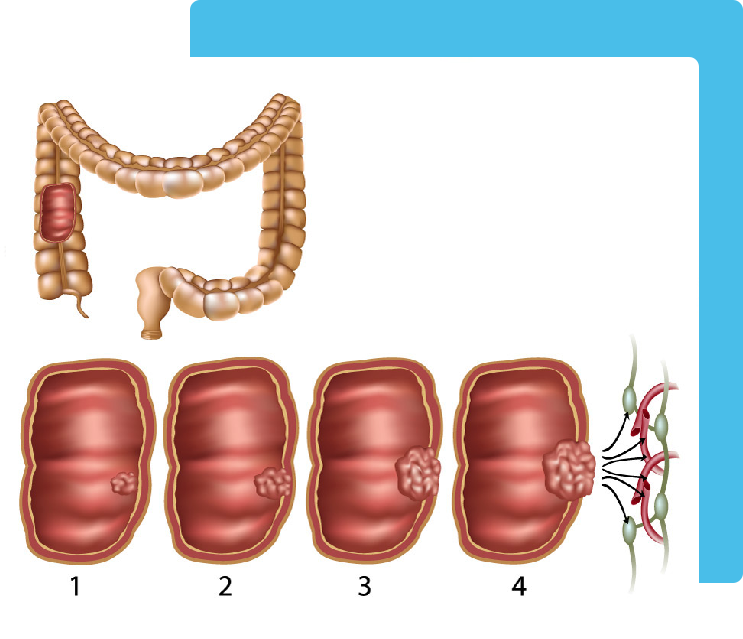
- Appointments
- Sunnybank 07 3344 1440
- Mater Health Hub 07 3041 5082
The bowel cancer develops in the inner lining of the bowel (mucosa) from uncontrolled growth of cells on the bowel wall called polyps. Most polyps are harmless (benign), but some become cancerous (malignant) over time, hence the focus is on removing polyps at colonoscopy. Left untreated, polyps can continue to grow and potentially undergo malignant change – becoming a cancer. As a bowel cancer enlarges, it may grow into or through the bowel wall. It may develop the capacity to spread to lymph nodes, or beyond – to the liver, lungs or abdominal cavity.
Bowel cancer ( Also called colon or rectal cancer depending on where it starts.) is the fourth most commonly diagnosed cancer in Australia, and it is estimated that 1 in 19 people will be diagnosed by the time they are 85. The average age of diagnosis is 69 year, however, recent data showed it is getting common in younger age group as well.

Some factors that increase your risk of bowel cancer include:
Symptoms of colorectal cancer include passing blood or mucus in stools, change in bowel habits like constipation or diarrhoea, abdominal pain, weight loss, lethargy or loss of appetite. Some patient present with iron deficiency. Advance cancer can present with bowel blockage, jaundice or fistulas. Large polyps and even bowel cancer may not cause any symptoms at all, particularly early in the disease. This makes it vital that everyone participates in the Bowel Cancer screening program, and/or attends for a colonoscopy.
Most patient have some symptoms or have FOBT positive results and undergoes colonoscopy. At colonoscopy, the cancer location is noted and a biopsy of the tumour is done. Sometime a spot (Tattoo) is done, that helps finding cancer during surgery. The colonoscopy also helps to identified any other cancer (synchronous) or polyps in the colon. A CT scan and MRI (In rectal cancer) is done to stage the cancer and rule out any cancer spread (Metastasis).
The treatment for bowel cancer is usually surgical, with chemotherapy considered after surgery for higher risk cancers. Rectal cancer may be treated by surgery, radiotherapy or chemotherapy, usually a combination of these. The order of treatments the depending on cancer staging, location and the patient’s fitness. The surgery typically involves resection of part of bowel and draining lymph nodes and performing anastomosis. Some patient may need temporary or permanent stoma ( colostomy or ileostomy).
Bowel cancer can be prevented, or treated early, by screening or the prompt investigation of symptoms. If you have any symptoms of concern or have a strong family history of cancer, should seek an opinion from specialist. People between age of 50-74 years, who are asymptomatic and not at high risk of colon cancer, the Cancer Council Australia recommends complete the free, at-home faecal occult blood test (FOBT) you receive in the mail every two years. FOBT is the most effective population screening tool for detecting early signs of bowel cancer. Removing polyps from bowel during colonoscopy can prevent them from converting in to cancerous growth. A healthy life style also decreases the risk of cancer.
All Copyrights © 2023 Dr. Kaushik Kumar
Powered by :: Growup Business Solution